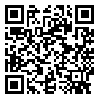BibTeX | RIS | EndNote | Medlars | ProCite | Reference Manager | RefWorks
Send citation to:
URL: http://jhsme.muq.ac.ir/article-1-94-en.html
2- University of Religions and Denominations, Qom, Iran., University of Religions and Denominations, Qom, Iran. ,
3- Department of Theology, Qom University of Medical Sciences, Qom, Iran., Department of Theology, Qom University of Medical Sciences, Qom, Iran.
Background and Objectives: Self-confidence, referring to relying on and exploiting individual abilities and talents for realizing spiritual and material prosperity, not only contradicts but is in agreement with and a prerequisite for faith in God. Practically, the greater faith in God one has, the more potent self-confidence he /she possess. Investigating the subject of self-confidence from the perspectives of Quran, Ahadith and psychology, this study explores the meaning of self (soul) in self-confidence and its levels, the prerequisites for development and enhancement of self-confidence, the association of self-concept and self-esteem with self-confidence, and the approaches to develop and enhance positive self-concept as well as to boost self-confidence.
Methods: The data of this descriptive review article were gathered from library and digital references.
Results: Although it appears that self-confidence contradicts Islamic teachings, it can be clearly understood that this teaching subject is confirmed and emphasized in Islamic teachings by discovery of its true meaning.
Conclusion: If having self-confidence is meant to rely on and exploiting individual abilities and talents to reach material and spiritual prosperity, it not only does not contradict but is in agreement with and a prerequisite for faith in God. Self in self- confidence indeed means human as a combination of the body and the spirit which is fully consistent with indices of self-confidence. According to psychologists, improving self-esteem and positive self-concept affects self-confidence directly. From perspective of religion, paying attention to venerability and God-given dignity of human, recognizing the superb purpose in life, etc. are approaches to develop and enhance positive self-concept and self-esteem, and to boost self-confidence.
Received: 2016/06/18 | Accepted: 2016/07/24 | Published: 2017/02/23
| Rights and permissions | |
 |
This work is licensed under a Creative Commons Attribution-NonCommercial 4.0 International License. |







